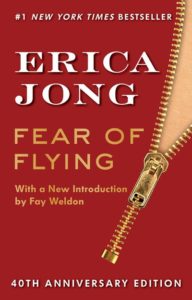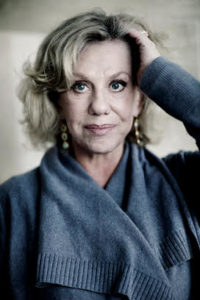![]()

- Get inspired to read more.
- Discover great books.
- Connect with other readers.
- Meet the authors for Q&As through Facebook Live!
As a busy FabOverFifty woman, finding time to read is not always easy—and finding a good book can be even harder. Yet reading is one of life’s true joys! We’re launching this Spread the Words book club in partnership with Early Bird Books to inspire you to read more. We’ll save you the time it takes to research and find your next great book. And we’ll connect you with other women reading the same book—so you can get more out of your reading experience and share your thoughts, observations, and questions. We’ll also introduce you to the author, who will host a Facebook Live chat at the end of each month, where you can hear his or her personal insights and inspiration—and even ask your own questions.
How It Works
The first book we’ll be reading is Fear of Flying, by Erica Jong. Erica will host a Facebook Live event on Wednesday, September 26th at 6:30 pm EST.
About Fear of Flying

The blockbuster novel of female freedom and empowerment that launched a sexual revolution
Isadora Wing has come to a crossroads in her five-year marriage: Should she and her husband stay together or divorce? Accompanying her husband to an analysts’ conference in Vienna, she ditches him and strikes out on her own, crisscrossing Europe in search of a man who can inspire uninhibited passion. But, as she comes to learn, liberation and happiness are not necessarily the same thing.
A literary sensation when it was published in 1973, Fear of Flying established Erica Jong as one of her generation’s foremost voices on sex and feminism. Forty five years later, the novel hasn’t lost its insight, verve, or jaw-dropping wit. This ebook features a new introduction by Fay Weldon, as well as an illustrated biography of Erica Jong, including rare photos and never-before-seen documents from the author’s personal collection.
Meet Erica Jong

Fear of Flying, Erica Jong’s 1973 novel, upended conventional thinking about women, marriage and sexuality, selling over 37 million copies. It articulated what women thought, but never voiced, through decades of silent complicity with the status quo. In Isadora Wing, her fictional doppelgänger, Erica created every woman – not as she existed in public life in the 70s, but inside a woman’s own mind. The author became a pillar of the sexual revolution and a hero to millions, not because of the sex itself, but because she quietly flouted the unspoken norms of the day to talk about sex unblinkingly.
In the 45 years since writing FEAR OF FLYING, Erica has published over 25 books in 45 languages, including nine works of fiction as well as celebrated non-fiction volumes such as What Do Women Want? and an anthology on sex called Sugar In My Bowl: Real Women Write About Real Sex that she edited. Comfortable and eloquent in various genres, she has almost effortlessly switched between fiction, nonfiction and poetry, becoming one of the most evocative poets of her generation with seven published volumes.
Erica’s awards for poetry and fiction include The Fernanda Pivano Award in Italy, The Sigmund Freud Award in Italy, the Deauville Award in France, and The United Nations Award for excellence in literature.
Erica’s 2015 novel, FEAR OF DYING, brought together a career of writing, reflecting, asking questions, trying to solve the puzzle of her own life, and in turn helped shed light on the lives of so many others. Questioning herself with deep honesty, Erica continues to open the sealed doors of our lives. She has just completed a book of poetry, The World Begins With Yes due to be published in 2019, and she is working on a new novel, Pussies Grab Back! or Tales From The Erotic Book Club. She also is adapting one of her favorite novels, Fanny Hackabout Jones, for an unlimited television series with director Julie Taymor. The world is catching up with Erica’s thinking about women.
Concepts to ponder while you’re reading Fear Of Flying
- Isadora struggles to be her own woman in a man’s world. How do you think things have changed for women since the 1960s and how are they the same?
- Isadora says relationships are always unequal, that those who love us most we love the least, and vice versa. Do you agree?
- How was Isadora shaped by her mother and sisters? Do you think her mother’s advice to reject the ordinary caused her pain or happiness?
- The book ends on an ambiguous note. What do you think happens when Bennett walks in on Isadora? Is the ending affirmative or a comeuppance? Is the bathtub scene a rebirth as some have said?
- What is it about Isadora that provokes empathy?
- Isadora often blurs the distinction between fantasy and reality. Is this seen as a virtue, a vice, or both?
- Isadora seems to feel most free when she’s experiencing sexual pleasure and when she’s writing. What’s the connection between these two aspects of her world?

**By joining Spread The Words book club, you agree to receive emails from FabOverFifty and Early Bird Books**


